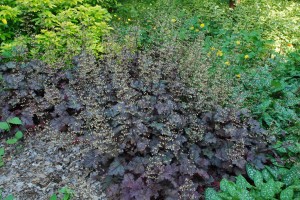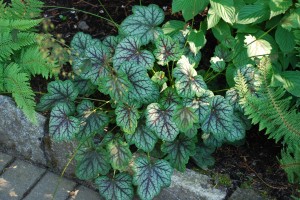Over the past quarter century, gardeners have enjoyed the wonderful heuchera revolution (USDA hardiness zones 4-9). A great many hybrid cultivars have been introduced with more arriving every spring. Unfortunately, the flood of new cultivars has given us a huge number of poor selections. As I talk with gardeners across the U.S., it has become obvious that there are regional diffences among heucheras. A poor performing cultivar in the Southeastern U.S. may shine in the Mid-Atlantic or Midwestern U.S.
Heucheras are herbaceous perennials with palmate leaves attached by long petioles to a thick basal stem. Foliage emerges in spring with a second growth flush coming on in late summer if plants are not environmentally stressed. Leaves are reliably evergreen in plant zones 7-9.
There is an enormous number of hybrid cultivars including leaves with ruffled margins, colorful venation , et al. Plant breeders have made significant improvements in toughness, performance, and foliage. H. americana and H. villosa have lent hardiness, vigor, and color. Heucheras thrive planted in moderate shade or full morning sunlight (in zones 5-7).
From 2012-14 Mount Cuba Center near Greenville, Delaware evaluated 83 varieties. The best performers were: Citronelle, H. villosa Bronze Wave, Cajun Fire, Color Dream, Steel City, Carousel, Apple Crisp, Frosted Violet, Southern Comfort, Spellbound.
Highly rated were: H. villosa ‘Autumn Bride’, Brownies, Creole Nights, Dark Secret, Guardian Angel, Miracle, Pinot Noir, Plum Pudding, Rachel.
How to use this data? Read the entire report on the Mt. Cuba website posted under” research”. If you garden in the Mid-Atlantic states or in zones 5-6, this regional report should be of value. For mid-westerners, a 4 year heuchera trial conducted by Richard Hawke was published by the Chicago Botanical Gardens (CBG) in 2003 and is still available for viewing on the CBG website. Dr. Leonard Perry at The University of Vermont has also evaluated heucheras in previous years.



 Posted in
Posted in 
